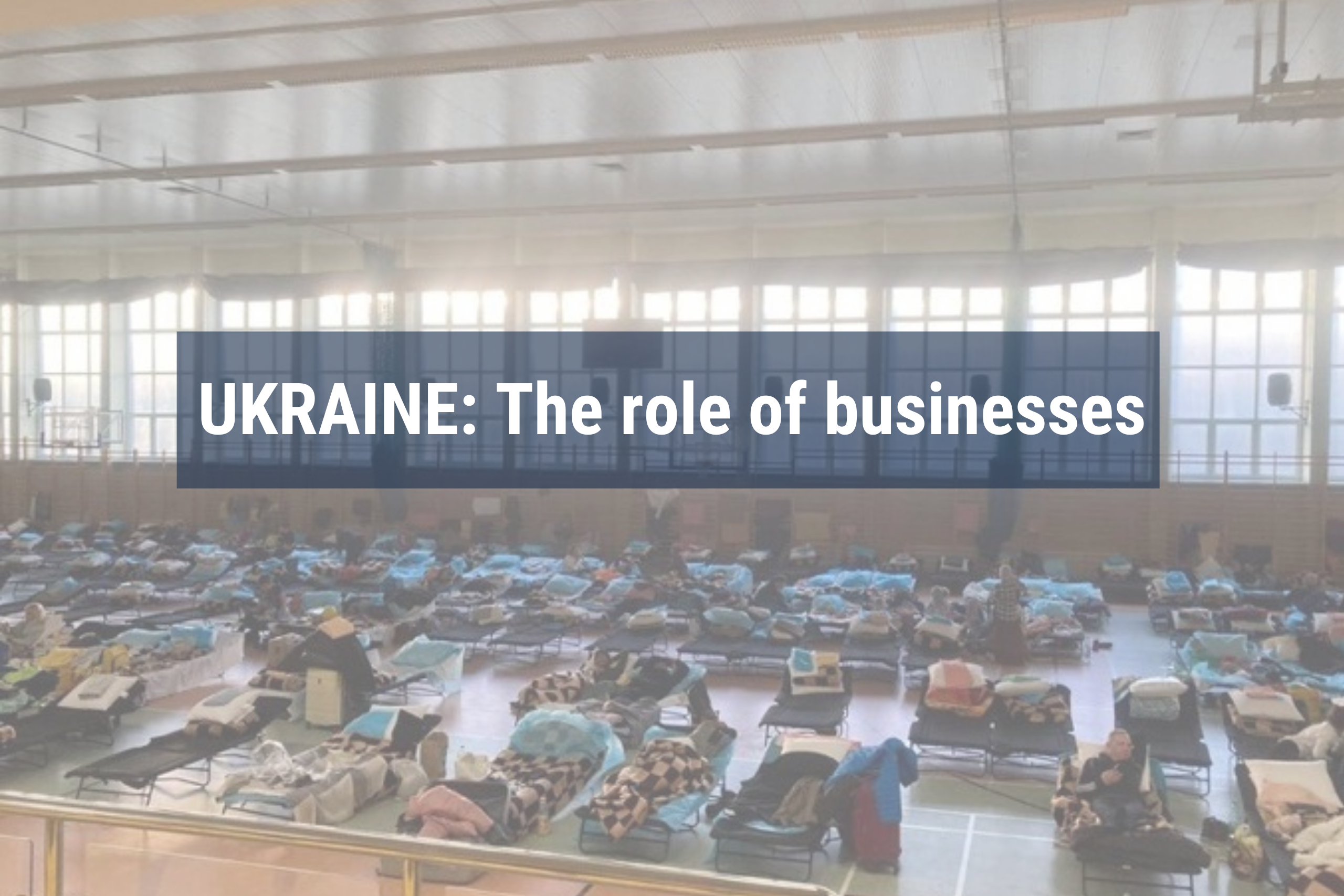
Blogs, Business & Human Rights, Featured, Media, News
BLOG | Ukraine: The role of businesses
Kylie Porter | April 6, 2022
Bodies in mass graves. Buildings crushed to the ground. Women and children in kilometre long queues to cross the border. Men armed for conflict. These are just some of the shocking images that we have been exposed to in relation to the war and the resulting humanitarian crisis in Ukraine. Over the past weeks, a number of UNGCNA participants have contacted us enquiring as to how they can help either from a humanitarian or human rights perspective.
In March, we had the privilege to be briefed directly by our colleagues from the Ukrainian Local Network and UN staff on the ground in Ukraine. Tatiana Sakharuk, Executive Director of Global Compact Network Ukraine spoke to us after driving her children more than 48 hours across the border without sleep to reach Poland, leaving her husband and male relatives behind. We were also joined by a lead humanitarian officer with the United Nations Office for the Coordination of Humanitarian Affairs (UN OCHA), speaking to us from a basement in western Ukraine where she was seeking shelter following air raid sirens in the area.
The briefing bought tears to the eyes of the UNGCNA team and we collectively felt that it was important to share our takeaways from our briefing whilst considering:
- How businesses can help in the short and medium term.
- Information on funding appeals.
- Details on support for Ukrainian refugees and migrants.
Key takeaways:
- The people of Ukraine fundamentally believe in their country’s sovereignty and will fight to keep their nation.
- While international reporting continues, understanding of the true scale of the war remains limited due to the closure of borders, ongoing shelling, and the disruption of communications. Those continuing to report from Ukraine still face grave security risks.
- Humanitarian support is needed immediately. Ongoing support will also be needed over the medium to long term.
- The ongoing military offensive is affecting men and women differently. While men have been required to remain in Ukraine, women and children have been affected by large-scale displacement and face increased risks of gender-based violence and human trafficking.
- Business has and will continue to have a key role where their value chain impacts the Ukraine. Businesses can also support in countries where Ukrainian migrants and refugees are resettling.
- Further education to businesses on enhanced human rights due diligence and conducting business in conflict zones is required.
As of 4 April 2022:
- Over 4 million people have left Ukraine, with an estimated 6.7 million people displaced within the country.
- Over 18 million people are estimated to become affected. Of these, 12 million are expected to require support and assistance.
The UN Global Compact and OHCA have developed a Ukraine Humanitarian Crisis guide for businesses. You can access this here.
How can your business support Ukraine?
1. Short term: Cash is King
With airports closed and trade routes disrupted, humanitarian workers are reporting that ‘the last mile’ in getting supplies to those affected has become extremely difficult. Urgent financial support is needed to support local efforts to move goods through established humanitarian logistics corridors.
If your business has a distribution channel into Ukraine and can support the supply of humanitarian products – please coordinate your response with the UN. If your business can provide financial support, the Ukraine Humanitarian Fund online (UHF) has been established to facilitate donations to areas of highest priority.
How to donate:
- Online: https://crisisrelief.un.org/ukraine-crisis.
- Wire transfer: the United Nations Foundation can receive a wire transfer for amounts over $10,000.
- Governments, private sector entities and foundations that wish to contribute can contact the OCHA Donor Relations Section.
For more information about the UHF, click here.
2. Short and medium term: Responsible business during active armed conflict and support for migrants
Ensure business respect for human rights in armed conflict
As part of your ongoing due diligence processes, ensure your business is not causing, contributing to, or directly linked to any adverse human rights impacts or violations of international humanitarian law. During armed conflict, this requires a two-pronged approach:
- Immediately prioritise enhanced human rights due diligence: consider what your business can and should do to mitigate adverse human rights impacts through its operations and supply chain, in line with the UN Guiding Principles on Business and Human Rights. While divestment or disengagement are typically a last resort, they are the correct course of action where the adverse impacts are considered “too severe”. Evidence of the crime of aggression, war crimes, or serious violations of international humanitarian law are considered indicators that impacts are “too severe”.
- Comply with the law of armed conflict if your business operates in Russia or the Ukraine: Both international humanitarian law and human rights law apply on the entire territory of a State party to an active armed conflict. Australian Red Cross has previously published guidance about the rights and responsibilities of businesses operating in a territory where the law of armed conflict applies, which is available here.
Supporting Ukrainian workers
The conflict has forced up to 79% of Ukrainian businesses to cease operations entirely or partially. To assist, the Global Compact Network Ukraine has launched an initiative called ‘Give a Job for UA’ to support Ukrainian workers, refugees and migrants by connecting them with potential employers throughout the world. Organisations with eligible vacancies can contact jobs@globalcompact.org.ua. For more information about the initiative please contact us.
Contributors: Emilia Maubach, Chris Caskey




